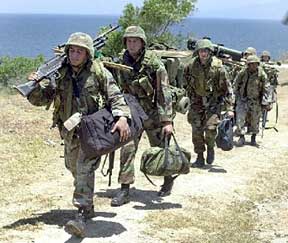|
Shift of U.S. Forces from Okinawa to Philippines
Seen
The Macapagal-Arroyo
government is reportedly deeply involved in defense talks with U.S. and Japanese
defense officials that would pave the way for the transfer of U.S. forces from
Okinawa to the Philippines for a long-term stay and the increased role of
Japanese security forces in Asia Pacific and elsewhere.
By Bulatlat
|
The Macapagal-Arroyo
government is reportedly deeply involved in defense talks with U.S. and Japanese
defense officials that would pave the way for the longer stay of American troops
in the Philippines and the increased role of Japanese security forces in Asia
Pacific and elsewhere.
U.S. Marines arrive
in Cavite for the Balikatan military exercises
|
 |
Bulatlat sources
from Tokyo and recent reports by Japanese newspapers last week revealed that
Philippine defense officials met their Japanese counterparts in Tokyo Feb. 9.
The meeting dealt with the possible transfer of U.S. forces now currently
stationed in Okinawa to the Philippines.
A source from the Asia-Wide
Campaign, a network of anti-bases progressives in Asia Pacific based in Tokyo,
also disclosed a project to build a permanent military training center in
Central Luzon for U.S. forces. The same source cited an interview by an Okinawan
journalist with House Speaker Jose de Venecia and former Defense Secretary and
now Interior and Local Government Secretary Angelo Reyes who both welcomed the
stay of U.S. Marines from Okinawa for the Balikatan exercises – but not to host
U.S. military bases.
The reports came on the
heels of what appear to be deeper involvement of U.S. military troops in the
Philippines. Over the weekend, about 40 U.S. special forces were reported to be
engaged in planning combat operations against guerrillas of the Moro National
Liberation Front (MNLF) in Jolo, southern Philippines. Fierce fighting erupted
between MNLF and government forces more than a week ago with several combatants
on both sides, including two Army officers, killed and about 30,000 civilians
evacuated.
Balikatan
exercises
A new Balikatan
(shoulder-to-shoulder) war exercises between Philippine and U.S. troops are set
on Feb. 21 – March 6 this year. Last December, post-typhoon disaster operations
in Quezon and Aurora provinces also saw the entry of hundreds of U.S. solders
supposedly for humanitarian reasons.
Hundreds of U.S. troops
have also been allowed to stay longer particularly in Mindanao where Balikatan
training exercises are regularly held.
Washington talks
A consultative meeting
between U.S. and Japanese defense and foreign officials began Feb. 19 in
Washington to negotiate for a new security arrangement that aims to deploy
Japan’s Self-Defense Force (SDF) for new assignments in Iraq and other
flashpoints throughout the world. The new security pact is supposedly integrated
to the new U.S. basing strategy that Pentagon unveiled in August last year.
The new basing strategy
seeks to transfer U.S. forces from Okinawa, South Korea and other host countries
for U.S. military bases to make them more mobile and near “security hotspots”
and anti-terrorist operations. But the new strategy also envisions the building
of new and larger U.S. military installations in the Middle East, Latin America
and Africa.
The continuing U.S.
military presence in Japan, South Korea, the Philippines and other countries is
reportedly being re-tooled to make U.S. forces jointly with Washington’s allies
more capable of containing China as an emerging power in the region as well as
to counter North Korea’s “nuclear threats.”
Reports in Japan said the
ongoing Washington talks will approve a “U.S.-Japan common strategic goal” which
declares to launch U.S.-Japan joint military maneuvers on the global scale, not
only in areas surrounding Japan, to jointly counter the “new threats in the
world.” Bulatlat
Related articles
Defense policy overhauled to meet new global threats
Review cites danger posed by North
Korea, China
Review now under
way on U.S. defense cooperation
BACK TO TOP ■
PRINTER-FRIENDLY VERSION ■
COMMENT
© 2004 Bulatlat
■ Alipato Publications Permission is granted to reprint or redistribute this article, provided its author/s and Bulatlat are properly credited and notified. |